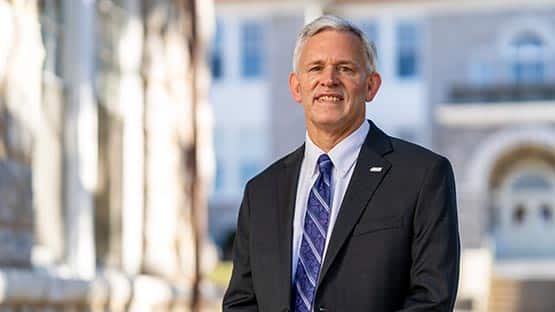
James Madison University President Jonathan Alger announced today that he will be stepping down after the conclusion of this academic year to accept the presidency at American University in Washington, D.C., effective July 1.
President Alger has served as president of JMU for 12 years, during which time the university has grown and evolved into a nationally recognized, student-centered research university.
“President Alger elevated the university to a place far beyond where JMU has ever been. Under his leadership, we have turned the page into the next chapter of the history of JMU,” said Maribeth Herod, Board of Visitors rector. “JMU is no longer the hidden gem in the mountains because Jon has led us to national prominence and is leaving the university after accomplishing so much together.”
Alger has represented JMU on numerous national boards and received the American Council on Education Council of Fellows/Fidelity Investments Mentor Award and the ALL IN Campus Democracy Challenge Standout Campus President Award in 2019.
“I am confident in the current leadership that we will continue our ascent as a university to the highest achievements,” said Herod. “This is yet another exciting time in the history of JMU, as Jon is leaving the university in an incredible place, with capable leadership throughout.”
Jonathan Alger: Highlights at JMU
- After conducting the extensive, “Why Madison” Listening Tour with constituents on and off campus, an ambitious new vision statement and strategic plan were developed focused on engaged learning, community engagement and civic engagement.
- JMU was reclassified as an R2, national research university and was accepted into the Association of Public and Land-grant Universities. Many of its academic programs have been nationally ranked.
- JMU earned the Carnegie Classification for Community Engagement, and received the Richard Guarasci Award for Institutional Transformation from Campus Compact.
- The comprehensive Unleashed campaign was successfully planned and executed, raising over $250M for university priorities. New philanthropic programs were created such as Women for Madison and the Madison Trust.
- The Valley Scholars Program for first-generation students was developed in partnership with seven local school districts (creating a pipeline for hundreds of students with full-tuition scholarships), and the Reddix Center for First Generation Students was established.
- The university joined the Sun Belt Conference, completed the most successful transition to the FBS level in Division I in NCAA history and appeared in its first-ever FBS bowl game.
- Many new or renovated facilities took shape, including the College of Health and Behavioral Studies, Hartman Hall (business), Student Success Center, Atlantic Union Bank Center, D-Hall, Dukes Dining, Paul Jennings Hall, Grace Street Apartments, Wilson Hall (renovation), Carrier Library (renovation underway), University Recreation Center (expansion and renovation), Sentara Park and new parking decks.
- Undergraduate applications increased to more than 40,000 by 2024, and overall enrollment reached over 22,000 students.
- The Madison Center for Civic Engagement was established and became a national leader in the field, and the Madison Vision Series brought many renowned guest speakers to campus.
- External research funding increased by 92 percent from 2019 to 2023, and the new Division of Research, Economic Development and Innovation was created.
- JMU has been a national leader for several years in producing international research fellowships through the Fulbright Program.
- The university significantly enhanced its diversity and inclusion efforts based on the work of multiple task forces and received several national recognitions for this work.
- After a university-wide educational process, three buildings on the historic quad were renamed for prominent Black members of the JMU community.
- The Honors Program became the Honors College.
- New and innovative academic programs were created, including the interdisciplinary X-Labs and a lab school collaboration with the Rockingham County Public Schools and Blue Ridge Community College.
- The Ethical Reasoning in Action program was developed and became a national model.
- The university’s endowment more than doubled.
- Need-based financial aid was significantly increased, and JMU joined the American Talent Initiative (focused on enrollment of low-income students).
- In two successive university-wide reviews by the Southern Association of Colleges and Schools Commission on Colleges, JMU was found in full compliance with all accreditation standards.
- JMU was named as the Top School in Virginia for getting a job for several consecutive years based on federal data, and recorded some of the highest alumni satisfaction rates in the nation.
- The university was recognized with the highest level of fiscal management autonomy under state law.
- JMU’s athletics program won two national championships (FCS football and women’s lacrosse) and had many teams make deep postseason runs.
- The university hosted ESPN GameDay for football three times—the only non-Power 5 school to do so.
- President Alger represented the university on many national boards such as the American Council on Education, American Association of Colleges and Universities (current vice chair), Campus Compact (past chair), ALL IN Campus Democracy Challenge (past chair), and the Knight Commission on Intercollegiate Athletics among others.
- He has represented JMU on the Virginia Business Higher Education Council, Northern Virginia Technology Council, and GO Virginia Regional Council for economic development.
In the coming weeks, the executive committee of the Board of Visitors will make a recommendation for an acting president to the full board for a formal vote. The university’s Board of Visitors will approve an acting president to start July 1 and begin executing the search process for the next president of the university.










